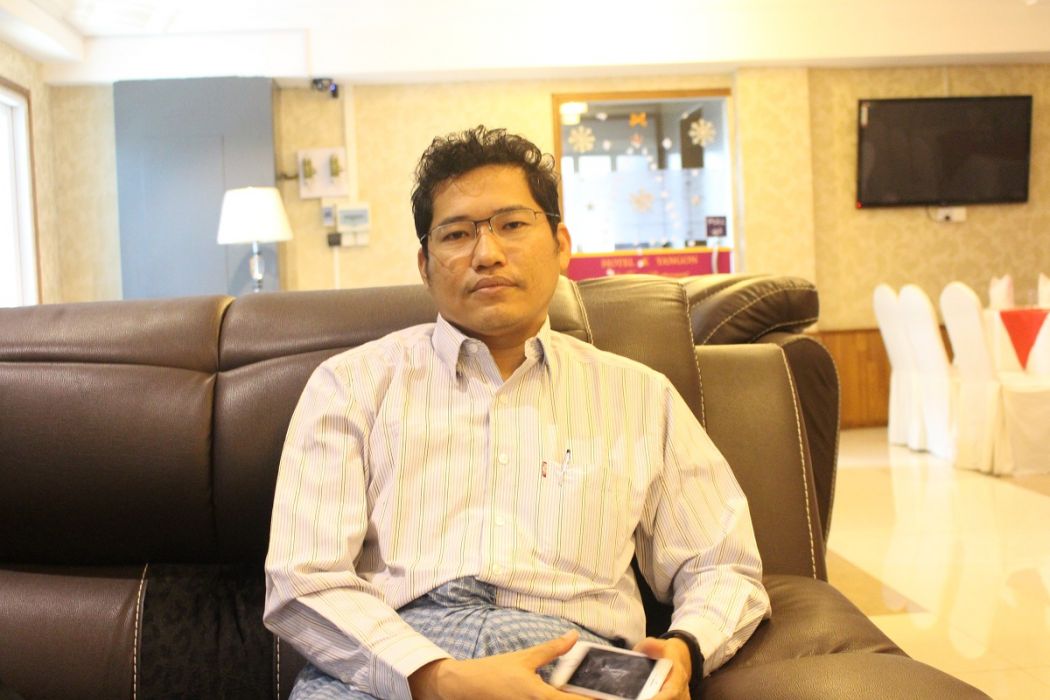Genius Shan Highlands Coffee founder Ngwe Tun discusses organic coffee growing, marketing, and the challenges for Myanmar’s coffee industry.
By Phyo Thiha Cho / Myanmar Now
YANGON — Despite the fact that Myanmar has many fertile upland areas, the country is not known as a major coffee producer unlike neighbours Laos and nearby Vietnam.
In recent years, local entrepreneurs have been exploring new ways to grow and market coffee domestically and abroad, with Ngwe Tun, the founder of Genius Shan Highlands Coffee, leading the way. The 41-year-old set up an organic coffee production chain — from growing to processing to marketing — and he runs a cafe that serve Genius Coffee.
After it was set up in 2012, his company quickly gained recognition and he received Kanbawza Bank’s Entrepreneurship Award 2014. In July 2016, his coffee received USAID international organic certification.
Ngwe Tun recently spoke to Myanmar Now about his business success and Myanmar’s coffee industry.
Question: What give you the original idea for creating Genius Coffee?
Answer: When I was abroad I saw some brands of Myanmar coffee, but most of them are instant coffee. There was small number of pure (ground) coffee brands, but these did not even mention manufacturing date. Then I got an idea to produce coffee with better quality and higher price. I first promoted my coffee through my close relatives. I then sold it in small packs as a trial.
Q: What were the early challenges when you started this business?
A: I had to try to find market information for my products. For example, we need to know how many coffee brands and plant species there are in Myanmar.
Q: How did you market your coffee brand, what customers did you aim for?
A: I targeted foreign tourists who wanted to buy Myanmar products as a souvenir to bring back home. I packed my coffee with paper bags, while other brands are put in plastic packing with bright colours. My packaging system does not pose health hazards because my target consumers care about this.
Q: What is the difference between common coffee and organic coffee?
A: I can tell you the exact source of my organic coffee. It was grown by 50 coffee farmers on 78 acres of land in Alal Gai Village in Ywa Ngan Township in Shan State. These farmers grow coffee through organic farming. So, the consumers can trust the taste and quality of my coffee, while other brands mix coffee from various areas.
Q: How did you organise the coffee growers to change to organic farming?
A: I had to talk to the locals about the benefits of practicing organic farming. I also persuaded them by offering higher prices. About 50 percent of them had changed to organic farming last year, but all the coffee growers in this village want to practice this system as they want to develop their village into a model zone for organic coffee plantations. So, I pioneered commercial production of organic coffee.
Q: Do you export Genius Coffee as well?
A: I started coffee export in 2013. While my raw coffee beans are shipped to Hong Kong, Taiwan and Singapore, ground coffee is sent to Australia and Japan. We have to send samples of our products to the foreign new markets first. The quality of our product meets ASEAN (Association of Southeast Asian Nations) level. As the soil used to grow our coffee plants is very fertile, we do not need to use chemical fertilisers like in Vietnam. The growth of my business can lead to employment opportunities, which is crucial for the development of the region.
Q: How many tons of coffee does Genius produce?
A: Our production ranges from year to year. We had 50 tons in the 2015-2016 fiscal year. Among them, 5 tons of coffee was exported. We expect to produce 200 tons in the 2016-2017 fiscal year.
Q: How many coffee producers are there in Myanmar, and why is this industry much smaller than for example Laos or Vietnam?
A: There are 50 coffee procedures in Myanmar. This industry did not develop well in Myanmar as the Agricultural Ministry of previous governments did not support them well. Instead, they were interested in mostly paddy. The ministries concerned never connected Myanmar coffee growers with to international coffee organisations. Coffee growers did not get loans, while governments in neighbouring countries were helping their coffee producers. As a result, Myanmar coffee producers lag behind their counterparts in neighbouring countries.
Q: Has Myanmar’s coffee industry grown in recent years? Is the export or domestic coffee market expanding?
The number of coffee producers has increased, although the exact number (of new producers) cannot be identified. As coffee plants take three to four months before reaching production, the output result cannot be known immediately.
Both coffee companies and consumers have increased, while local and export demands are getting higher. Export market demand for our brand has increased from 1 to 6 tons in recent years.
Q: What sort of coffee is used in the popular coffee mix consumed in Myanmar?
Robusta coffee is used for coffee mixes in Myanmar. Coffee mix producers import this coffee from Vietnam, Thailand and Indonesia due to the lower prices, compared to robusta coffee from the Thandaungyi area, in Kayin State. The reason for higher cost of the local coffee is because of weak infrastructure and higher labour wages in Myanmar.




